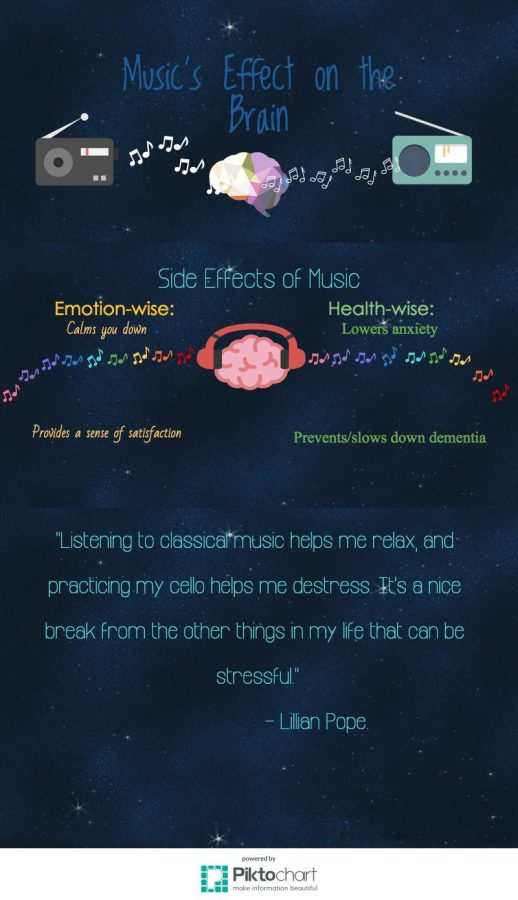It was another normal, stressful day for ninth grader Lillian Pope, so she decided to take a break and practice her cello. As she began playing a new piece, she felt calm, and suddenly happy as the music filled her head. Lillian is not alone to turn to music as her source of serenity; many people, musician or not, turn to the magic of music.
Music has an effect on your brain, whether it can excite you during an upbeat song or calm you down with a classical piece. It can also be used for medical reasons such as calming minds or treating stress.
A study done by Daniel Levitin and his colleagues at McGill University showed that music lowered down the level of stress hormone cortisol or levels of anxiety. Before a surgery, either the patients took an anti-anxiety pill or listened to music. The results were that the hormone cortisol was lowered more with music than the anti-anxiety pill did. Even Pope said that she used music to calm herself down.
“I feel like when I practice my cello, I’ll often do it between homework,” she said. “It kind of gives me a way to destress and focus on something different because a lot of time school can just be overwhelming.”
Listening to music can also help fight off germs and bacteria. Music is associated with immunoglobulin A, an antibody that helps with immunity. It also heightens the amount of cells that fight germs and bacteria. Playing or listening to music can help with even more intense medical conditions. For example, there is evidence that people with Alzheimer’s disease remember things better when listening to music. It can even prevent or delay dementia, an overall term used to describe memory loss or diseases that cause memory loss.
“Music has a calming effect and it is proven that it can slow your brain down enough so you can focus on the task at hand,” said Rylan Smith, the Middle School Counselor.
Not only can music be good medically, it can also help calm people down and make someone happy. When your favorite song is played, you’re not only feeling excited or soothed by the sounds but your brain is also reacting to the music. According to Robert Zatorre, professor of neurology and neurosurgery at Montreal Neurological Institute, music surpasses the reward system of the brain. When this happens, a chemical called dopamine that pleasures stimuli are released from the reward system in the brain, called the ventral striatum.
“Dopamine is a reward for your brain and it tells your brain good things are going on,” Mrs. Smith said.
Slow, quiet, classical music can calm someone down. It slows your pulse, lowers blood pressure, and decreases the amount of stress hormones. Music itself can help communication and coordination in disabled children. Music therapy, a therapy that uses music to help people’s minds and reduces emotional stress, is also a treatment used. There are music therapists that treat people by using music.
“Listening to classical music helps me relax, and practicing my cello helps me destress,” Pope said. “It’s a nice break from the other things in my life that can be stressful.”













